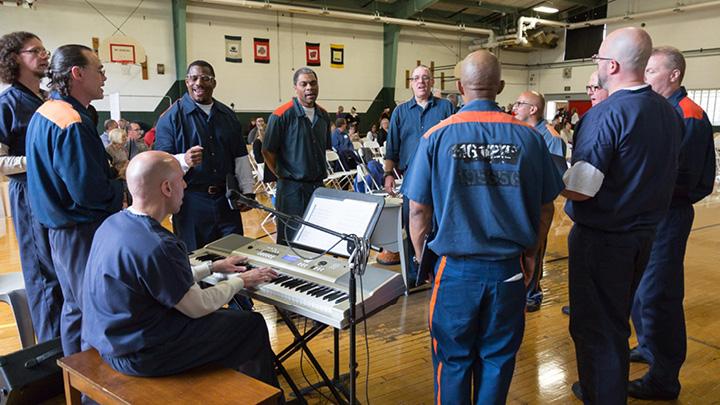Turning over the keys

Stop by the Richard A. Handlon Correctional Facility in Ionia, Michigan, and you’ll witness a “new normal.”
Sure, the 20-foot-tall barbed-wire fencing, 8x8 cells, armed guards, and the numbered uniforms are all still there.
But, for 85 men, they feel much less confining or defining.
Upon visiting Handlon, you’ll find prisoners reading Plato and Aristotle in their cells, debating age-old questions and big ideas over lunch, tutoring one another, leading Bible studies and worship services, and getting ready to start mentoring groups for substance abuse, modeled after AA meetings.
In many ways you’ll find a thriving, disciplined culture.
Laying the foundation
During the past five years, the Calvin Prison Initiative (CPI)—a partnership between Calvin University, Calvin Theological Seminary, and the Michigan Department of Corrections, that offers inmates a bachelor of arts degree from Calvin University in Faith and Community Leadership—has been working to foster such an environment.
Their goal from the start: to transform the prison system through education.
“It’s the key,” said Todd Cioffi, director of CPI. “We are building a spiritual and moral community, and doing it primarily by way of education.”
The atmosphere at Handlon is evidence that that is indeed happening.
For the past five years, inmates at the facility have benefitted from having Calvin professors teaching them inside the fences of Handlon on a daily basis and students from Calvin’s Knollcrest campus coming in regularly to provide tutoring. While abnormal in most prison settings, this was the “new normal” at Handlon. And the resulting culture reflected that commitment.
A storm rolls in
On March 12 came a major test to this “new normal.”
“It’s in moments like these where we get an opportunity to see if it’s all paying off,” said Cioffi.
Restrictions put in place because of the COVID-19 pandemic meant as of March 12, no more Calvin professors or students could step inside the fences at Handlon.
“In this time of uncertainty and isolation from one another, it can become harder to see first-hand the ways God is working around us,” said Kary Bosma, director of operations for CPI.
The restrictions were put in place less than two months from the anticipated graduation date of the first cohort of bachelor’s degree students inside a Michigan prison. The school year appeared to be headed for a lockdown.
Weathering the storm
But, just like their peers 40 miles south on the Knollcrest Campus, the students inside Handlon weren’t giving up on their education.
“It’s always been our experience that the CPI students are eager learners, and that has not changed in the present circumstances,” said Cioffi.
In fact, what the CPI students have been equipped to do: take the lead in their communities and be agents of renewal, is indeed happening.
“I wish you could all experience and partake in some of the joy that I feel during the services when I see and hear the preaching that some of the CPI students are doing,” wrote a CPI student in a letter to the CPI staff. “You all would be proud of what is happening here during this time when outside volunteers are not able to make it in to preach. If you need some encouragement, I’m telling you – the fruit of your labor is ripening.”
“At other facilities, the church services might just stop,” said Cioffi, “for ours to just keep going as if nothing much has changed is incredibly telling.”
Becoming the builders
“This is such an encouragement to us,” said Bosma. “The students who’ve been preparing for Christian leadership roles inside the prison through CPI are being given the opportunity to preach and lead worship in those services! They are leading at a time when outside visitors are prohibited from coming in, leading their church communities and providing a pastoral presence.”
And it doesn’t stop there.
The senior students are staffing the prison’s Rhetoric Center, another senior who loves philosophy has started doing regular tutoring sessions with the first-year cohort, students are continuing to build the podiums for Commencement in the wood shop, and those students who are training to be pastors inside the prison system are continuing to prepare sermons.
“It keeps their mind occupied, focused on something good as opposed to fixated on the uncertainties, the fears, and the changes,” said Cioffi. “For example, the cancellation of visits can negatively impact them emotionally, so to not be focused on that and sit in their cells with nothing to do, it doesn’t surprise me that they continued on and stayed focused.”
And just like with students on the Knollcrest campus, the education has successfully moved online. Professors are preparing material for the CPI students. The material goes on a hard drive the size of a deck of cards that gets driven up to the campus in Ionia every weekday.
That small hard drive is a metaphorical key—unlocking the world of education to these students during this time. And the students are being productive.
“I bet when we get back, we are going to hear how the Calvin guys really stood up and did the right thing in the units, all over the place. I’ll be shocked otherwise,” said Cioffi.
Everything is still “normal” at Handlon. And while the graduation ceremony will be delayed, the completion of requirements for graduation certainly will not.
The students are completing assignments weeks before they are due. And their only in-person accountability is to one another and to the culture they are helping create.
That’s what’s happening in this square inch.






